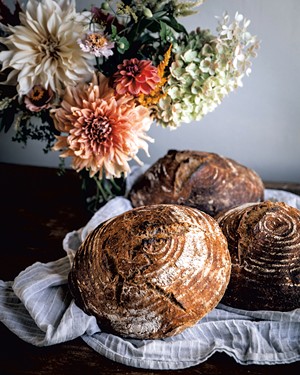
- Courtesy Of Carey Nershi
- Bank Street Bakery bread
In the introduction to the original 1973 edition of his Beard on Bread: A Cookbook, trailblazing chef James Beard wrote, "Breadmaking is something of a gamble."
Bread's ingredients are simple: flour, water, yeast and salt. When combined, however, they're surprisingly susceptible to changes in temperature, humidity, air composition and even the microbiology of the baker's hands. "Once you have made a particular loaf successfully there is no guarantee that it will work automatically thereafter," Beard wrote.
That gamble has paid off for many Vermont bakers, who work with the weather and the dough's moods to supply boules, bâtards and baguettes that put the plastic-wrapped industrial stuff to shame. Bakers such as the team behind Elmore Mountain Bread and the late Gérard Rubaud (whose bakery lives on as Trent's Bread) have proved that small-scale bakeries can turn out outstanding bread, and Vermonters will eat it up.
Now a new batch of micro-bakers is firing up home ovens; mixing dough by hand; and selling loaves via word of mouth, farmers markets and Instagram. Their inspirations include those community-focused bakers, local grain farmers and the pandemic sourdough trend.
We spoke with four bakers who are making bread both gluten-full and gluten-free and keeping things small: eight to 400 loaves a week.
— J.B.
Labor of Loaf
Bank Street Bakery, St. Albans, @bankstreetbakery
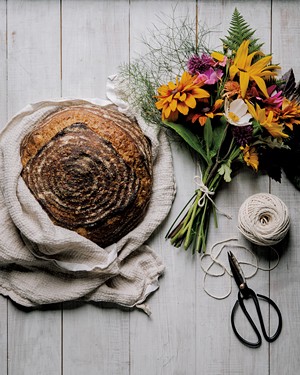
- Courtesy Of Carey Nershi
- Bank Street Bakery bread
The first time Ashley Murphy tried to make sourdough bread, she failed miserably.
"I gave up," Murphy, 34, said. But two years ago, just ahead of the wave of pandemic sourdough hobbyists, she tried again — and it worked.
At the time, Murphy was the produce category manager at South Burlington's Healthy Living Market & Café, where she'd worked for 10 years. After she went on maternity leave, however, reordering her life so she could stay home and take care of her family became a priority.
"You get used to nurturing things," Murphy said, "and I couldn't stop thinking about baking bread."
Murphy launched Bank Street Bakery from her certified home kitchen in the fall of 2021. Since Halloween, she's been baking 24 loaves of French-style sourdough a week to sell at Four Quarters Brewing's farmers market in Winooski.
At the Sunday market, Bank Street's sweet levain boules fill both sides of a butcher paper-covered table. In the middle, Murphy sets up a display loaf sliced in half — so customers can see its open crumb — and another sliced into bite-size, lightly buttered pieces for sampling.
Each two-pound loaf costs $9 and comes wrapped in paper and string like a gift. The crackly-crusted loaves are soft inside, with a slight sweetness rather than a sour punch.
Murphy's circa-1865 home in St. Albans had two units when she bought it in March 2020. The extra kitchen upstairs now makes an ideal bakery.
The drafty house has steam heat, which keeps it freezing downstairs and boiling hot upstairs. "The yeast loves it up there," Murphy said.

- Courtesy
- Ashley Murphy of Bank Street Bakery
Her recipe draws on the sweet levain method described by Ken Forkish in his book Flour Water Salt Yeast: The Fundamentals of Artisan Bread and Pizza, which involves adding a bit of yeast in the final step of the mixing process. The yeast speeds up fermentation just enough to keep the dough sweet, Murphy explained, because the higher-temperature fermentation encourages lactic acid production.
"Somebody asked me if I put sugar in the loaf," she said with a laugh.
The unique flavor of Bank Street's loaves has a second source: organic local and regional grains. Murphy picks up Vermont-grown all-purpose flour and hard red Redeemer wheat from Nitty Gritty Grain of Vermont in Charlotte and sources spelt and rye through Healthy Living. As much as 35 percent of each loaf consists of wheat, spelt and rye that she mills fresh on baking day; she uses the local all-purpose flour for the rest.
For now, Murphy makes only sweet levain. "Since I'm baking in such a small kitchen, I had to choose a direction," she said.
In the future, though, she envisions adding seeded loaves, rye bread or a sliced, tin-baked recipe called the Approachable Loaf, which was developed by the Washington State University Breadlab.
She wakes at 3 a.m. to bake the 24 loaves for market, using two Dutch ovens in each of her two regular home ovens at a time. Each complete bake is a 24-hour process that includes the first feeding, hand-mixing the 50-pound batches of dough, fermentation and a 12-hour cold proof.
Murphy has been waiting for a new Rofco B40 Brick Bread Oven since July. When the hearth-style oven arrives — in the next month, she hopes — she'll be able to bake 12 loaves at a time.
"I'm enjoying this moment where I have to make everything by hand, doing everything basically the hardest way possible," Murphy said.
Someday she may add wholesale, and she recently added limited weekly home delivery via Instagram to St. Albans, Winooski and South Burlington. But for now, she'll stick to one baking day a week.
"It works well with having a baby at home," Murphy said. "He's going to be small for at least another couple of years."
— J.B.
Sourdough for All
Bonté Bakery, Calais, bontebakery.com
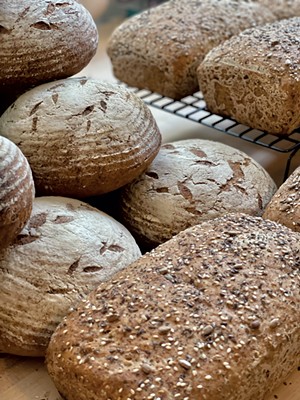
- Courtesy
- Bonté Bakery's sourdough gluten-free loaves
Anne Marie Shea's booming home-based bread business was born out of disappointment. Make that "disappointment after disappointment," she said.
Shea, 40, developed serious digestive issues when she was pregnant with her now-13-year-old son. She resolved her ailments by eliminating gluten and corn from her diet, but the challenges were not over.
Beyond learning to navigate grocery shopping and dining out, Shea craved delicious baked goods. "It was such a struggle," she said. "So many gluten-free bakery products were terrible: grainy, filled with gums or other weird stuff."
Eventually, Shea took matters into her own hands — literally. She started by making pastries and cakes before tackling the big prize: a wheat-free, naturally leavened sourdough loaf.
"I had a love affair from afar with sourdough. It's so earthy, natural, raw and beautiful — everything I love," she said. "I said, 'I'm gonna do this because no one else around here is doing this.'"
After experimenting over several months, Shea finally developed a healthy sourdough culture without wheat. In April 2021, she launched Bonté Bakery from her Calais home. The name references the French word for goodness or loving-kindness, "because gluten-free people need loving-kindness, too," Shea said.
A handful of Vermont retail stores now carry Bonté sourdough breads, priced at $10.50 to $13.50. The line includes traditional round boules that are plain or flavored with fresh rosemary and olives, and unsliced plain or seeded sandwich loaves.
The loaves have an appealingly rustic appearance, with pretty patterns cut into the boules. They contain no gums or "other weird stuff," as Shea would say, just a careful blend of gluten-free flours and psyllium husk, a plant fiber that she credits with "amazing elastic properties."
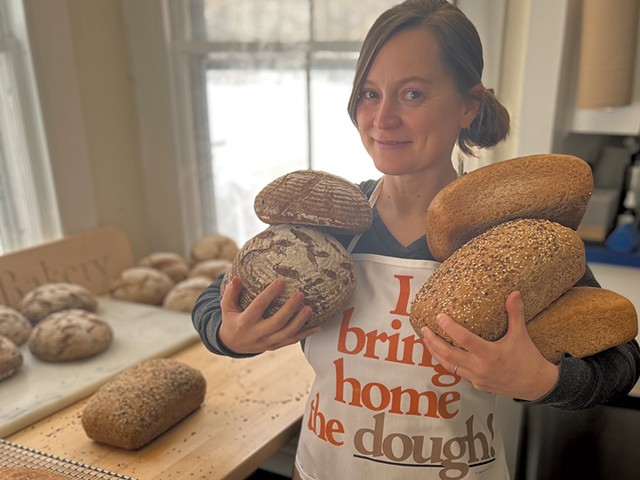
- Courtesy
- Anne Marie Shea of Bonté Bakery
Shea's other not-so-secret strategies include traditional techniques such as hand kneading and shaping, proofing the dough in basket forms, baking on hot stone slabs, and using steam in her oven.
Initially, Shea marketed through email and word of mouth to her neighbors, who came to pick up bread from her back porch. Among them were Rod and Sandy Buck, who have been gluten-free for about a decade and have tasted their share of disappointing breads around the country.
Rod said they became immediate fans of Bonté bread, which they count among the best they've eaten anywhere.
"They just look like they're going to be really good," he said. "They have a thick, nutty crust and a moist inside, not dry and crumbly like so many gluten-free breads. And they have terrific flavor."
While Bonté loaves may lack the craggy crust and deep chew of gluten-full sourdough, even gluten eaters will find them very palatable, especially toasted. In a small Seven Days poll of gluten-free eaters, samples elicited positive responses, including the flat-out "This is the best gluten-free bread I've ever tried."
The proof is in the sales. Though Shea used to sell her sweet offerings, she quickly discontinued those to focus on bread, for which there was more consistent demand, she said.
With one employee and a little spousal assistance, she has been producing 400 loaves a week in the mother-in-law apartment attached to her family's home. And, Shea said, "We're selling out like crazy."
The downside of that success is that Shea has reluctantly pulled back on her fall 2021 expansion into some Burlington-area retail stores. She is looking at funding a wholesale bakery off-site and hopes to be selling her bread in Burlington again by the end of 2022. "We grew a little too big too fast and want to take a step back and be intentional in how we grow," she said.
Shea is motivated by memories of Bonté's earlier days, when she was the sole baker, delivery driver and shelf stocker. "My favorite part," she said, "is when I am doing a delivery and a customer comes up and says, 'Thank you. It's amazing to be able to eat real bread again.'"
— M.P.
Rise and Shine
Downhill Bread, 26 Main St., Bristol, @downhill_bread
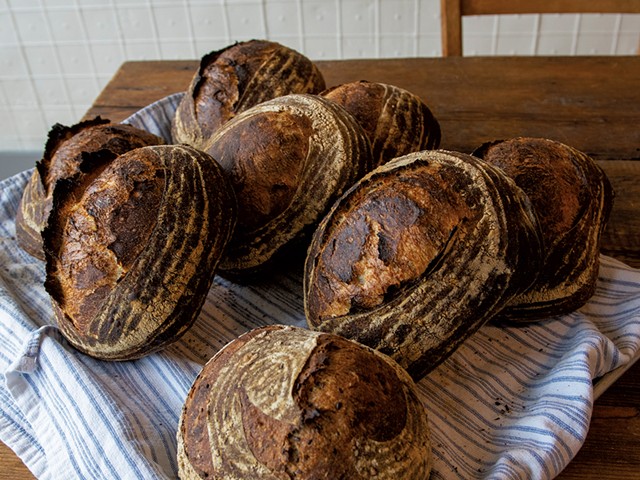
- Caleb Kenna
- Loaves from Downhill Bread
In the world of commercial bread bakers, Brooks Bezamat is a late riser.
He starts mixing and proofing for Downhill Bread at 3 p.m., then lets the dough ferment in the fridge overnight. The baking begins between 5 and 7 a.m. the next day.
"I've never been someone who wanted to do bakers' hours," he said.
Bezamat, 41, has been cooking for 17 years, catering with the Hindquarter in Huntington for the past six while working on the line at Burlington's Restaurant Poco and the Great Northern in the winters. He learned to bake bread at home as a hobby in the summer of 2020, selling the loaves at the Lincoln General Store — six per day, five days a week.
"A home oven does not produce a lot," Bezamat said. "It was absolutely insane how inefficient it was. But people seemed to like it."
Burned out on the long, hard hours of catering, he decided to step away from cooking and focus on Downhill Bread full time. In November 2021, he started renting space at Tandem, the commissary kitchen in Bristol.
Now Bezamat makes 150 to 160 loaves per week, which he sells on Wednesdays, Thursdays and Saturdays at Tandem, Lincoln General Store and Beaudry's Store in Huntington.
He bakes all that bread in just one oven. Like Murphy of Bank Street Bakery, he doesn't have a mixer, so he whips up 15-loaf batches with his bare hands. "My elbow was hurting for a bit, but I switched arms," he joked.
Working on a small scale lets him take an observational rather than mechanized approach to baking, Bezamat said. He doesn't set timers or take the temperature of the water he uses, instead adjusting various factors to fit the ever-changing behavior of his starter.
"It makes it more fun," he said. "I don't ever want to be this big bread manufacturer, where everything's so exact."
Bezamat makes the bread he likes to eat, with a slightly darker crust than many commercial bakers dare to sell, particularly on plain bâtards.
"I like that flavor, that slight bitterness," he said.

- Caleb Kenna
- Brooks Bezamat of Downhill Bread
It reminds him of the bread Julianne and Didier Murat used to sell at Vergennes Laundry when they owned the café. While he hasn't tasted their bread in years, he draws on his memory to emulate it.
"When they started buying my bread and said it was very good, it was a huge compliment," he said. "That's when I knew I was in the game."
Bezamat's other big source of "recipes and bright ideas" is Chad Robertson, founder of the California bakery chain Tartine, he said. Among his Tartine-inspired offerings are a polenta bread with herbes de Provence and olive oil, a whole-wheat flax-and-sunflower combo, and a cheesy loaf — though Downhill's version features Spring Brook Farm Cheese's raclette-style Reading instead of Gruyère. Loaves cost $7 to $9, depending on the variety.
Bezamat bakes with stone-ground organic whole-wheat flour and King Arthur Baking's high-gluten, 12.7 percent-protein bread flour. Besides the bread, he also sells a small selection of pastries. Rather than wait around during the downtime when the dough is fermenting and proofing, he makes canelés, éclairs and tarts.
Those pastries may be a temporary diversion, Bezamat said. Once he hooks up a second, bread-specific oven, and maybe a mixer, he hopes nearly to double his volume of bread — or cut his time in half, depending on demand. He'd like to get to 80 loaves a day, maintaining the distribution himself.
"Everyone keeps asking when I'm going to get bigger," he said. "I understand that thought process, but I want to be really careful not to create something where it's overwhelming and I can't get away from it."
It's unlikely Downhill Bread will ever be on the shelves of large retailers, Bezamat said. When customers pick up a loaf from the self-serve table at Tandem, it's usually still warm.
"I want to be sure it's sold the day it's baked," Bezamat said. "There are people making exceptional bread on a bigger scale around here. [But] I think there's a lot of room for people to make bread just for their small town."
— J.B.
Dough-Re-Mi
Wren Kitz, Burlington, @wren_kitz
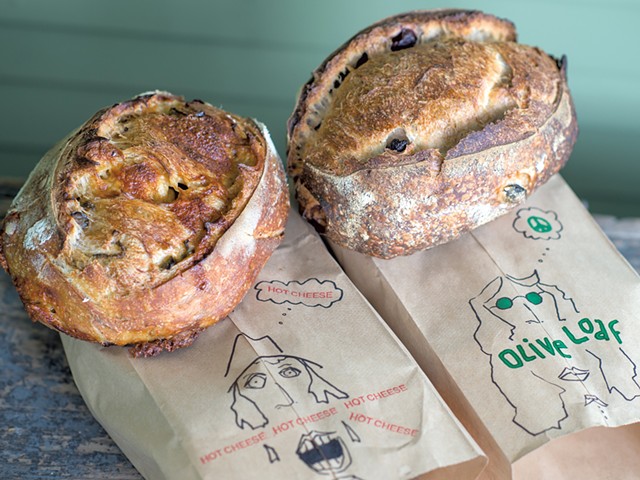
- Daria Bishop
- Loaves of freshly baked bread by Wren Kitz
Wren Kitz hasn't named his nascent bread business yet. Since the end of November, he's been announcing bread offerings every week or so on his personal Instagram and quickly selling out of eight to 15 hefty, bronzed sourdough loaves priced at $10 apiece.
Each week in his home kitchen, Kitz mixes, shapes and bakes a batch of either his olive or his chile-spiked hot cheese loaves. Customers pick up their bread from a bright blue cooler on his Old North End front porch. Their first bite into the supremely crunchy crust reveals a beautiful open crumb and bold flavors.
Kitz, 34, is known locally for his music more than his bread. Seven Days coverage of his releases and performances includes a December 2020 review that describes Kitz's musical evolution as a "stimulating and fascinating ride."
Last summer, Kitz left a seven-year stint as a residential counselor working with teens to focus on his music. But it's hard to make a living as a musician, he acknowledged — especially during a pandemic. He returned to a previous career as a baker to generate a little steady income.
The pandemic sourdough surge pushed him in the same direction, Kitz said. "I wondered, If I started making bread and telling my friends and putting it on social media, would people buy it?"
The answer was a resounding yes.
Lately, photos of Kitz's drool-worthy loaves have usurped his music-related Instagram posts, though he did link to a January 17 Vermont Public Radio show about his old-school taped field recordings.
Eli Goldman of Burlington is a fellow musician who follows Kitz on social media and has ordered his loaves several times. "They are really delicious and still warm when I've picked them up," Goldman said. "At a store, I might not pay $10 [for a loaf of bread], but on a person-to-person basis, I'm indirectly supporting Wren's art, too."
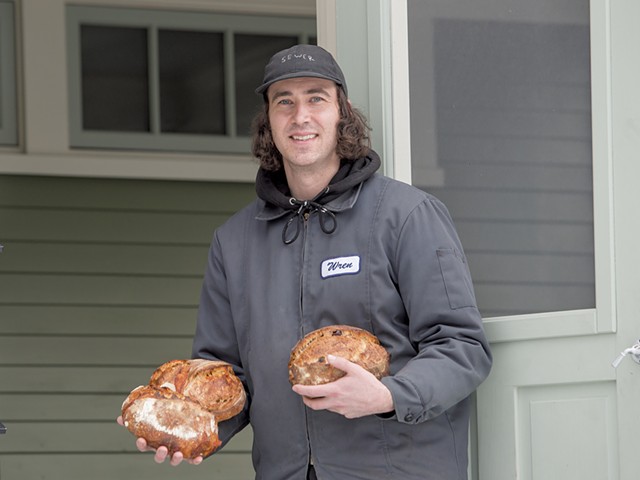
- Daria Bishop
- Wren Kitz
Goldman is especially a fan of Kitz's hot cheese loaves. The baker massages chile paste homemade from dried chipotle, árbol, habañero and bird's-eye chiles into the dough, which he then spangles with freshly pickled jalapeños and chubby cubes of cheddar. For his olive loaves, he folds in generous handfuls of purple and green kalamata, alfonso and Castelvetrano olives.
Bakers refer to such non-dough ingredients added to loaves as "inclusions." In using them, Kitz considers a former boss — Chuck Conway, baker and co-owner of O Bread Bakery in Shelburne — his guru.
"He always said, 'You should add as much as you possibly can without compromising the structure of the dough,'" Kitz said. "You want to taste the olives."
Besides O Bread, Kitz has worked at August First in Burlington. The Keene, N.H., native moved to Vermont about a decade ago for music and for bread, having become obsessed with baking in college. "I was told Vermont had a lot of really good bread," he said.
Kitz hopes to continue building his bread following, inching forward within the limits imposed by the oven and fridge in the home he shares with his partner. He recently invested in a mini fridge that he will devote to cold-proofing his dough.
"It's reinvigorated this dream of having a bakery of my own," Kitz said. "This is a way of testing it out."
— M.P.
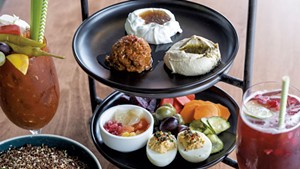
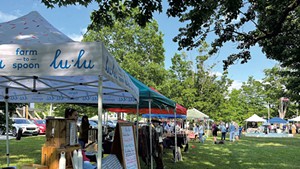
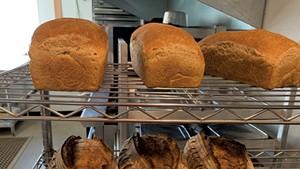
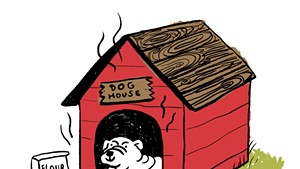
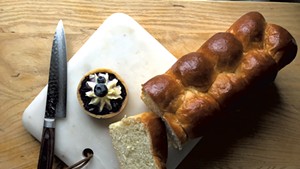









Comments
Comments are closed.
From 2014-2020, Seven Days allowed readers to comment on all stories posted on our website. While we've appreciated the suggestions and insights, right now Seven Days is prioritizing our core mission — producing high-quality, responsible local journalism — over moderating online debates between readers.
To criticize, correct or praise our reporting, please send us a letter to the editor or send us a tip. We’ll check it out and report the results.
Online comments may return when we have better tech tools for managing them. Thanks for reading.